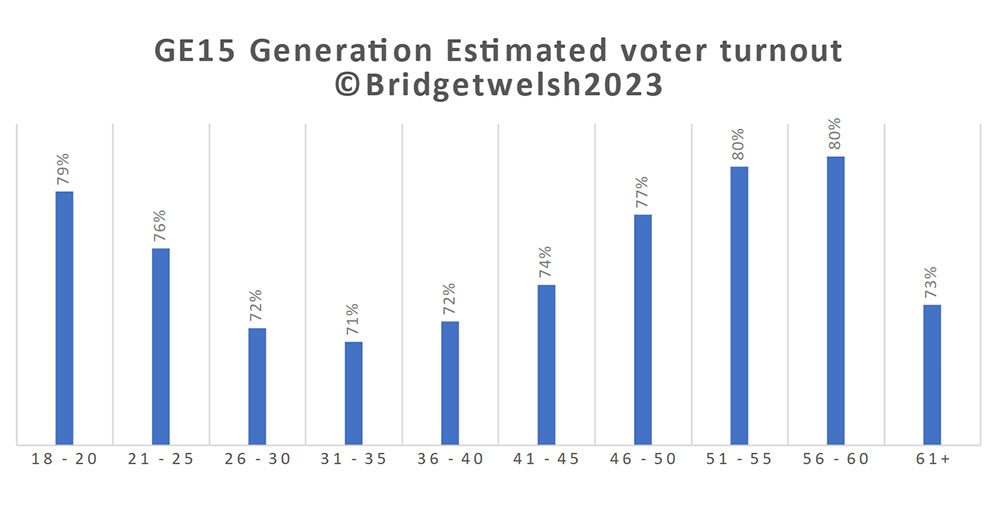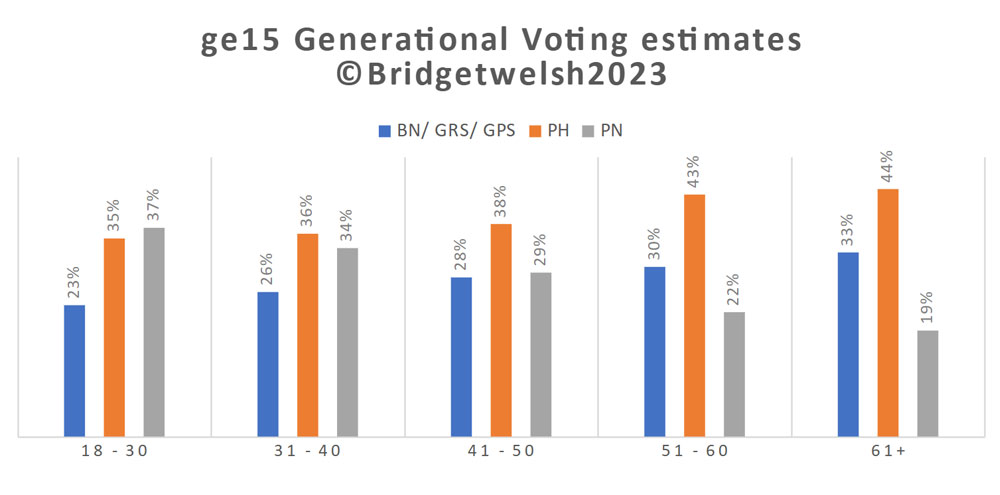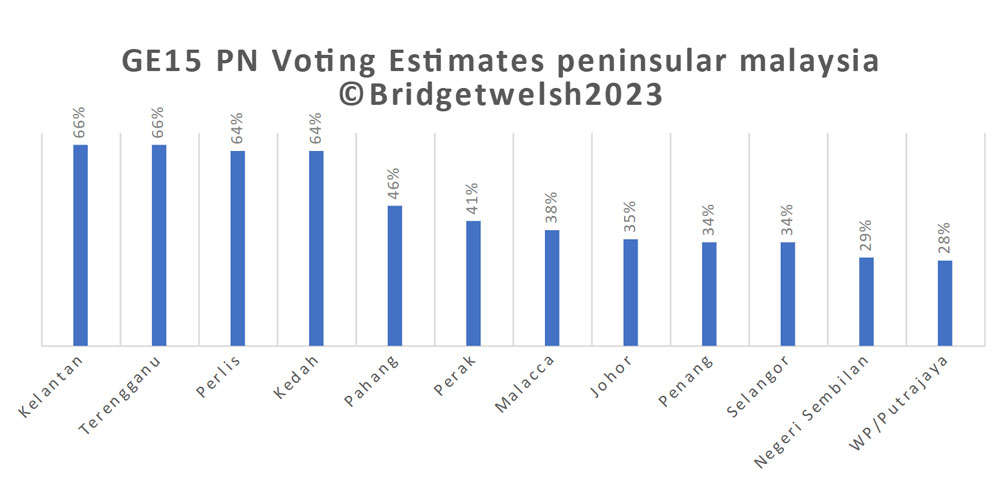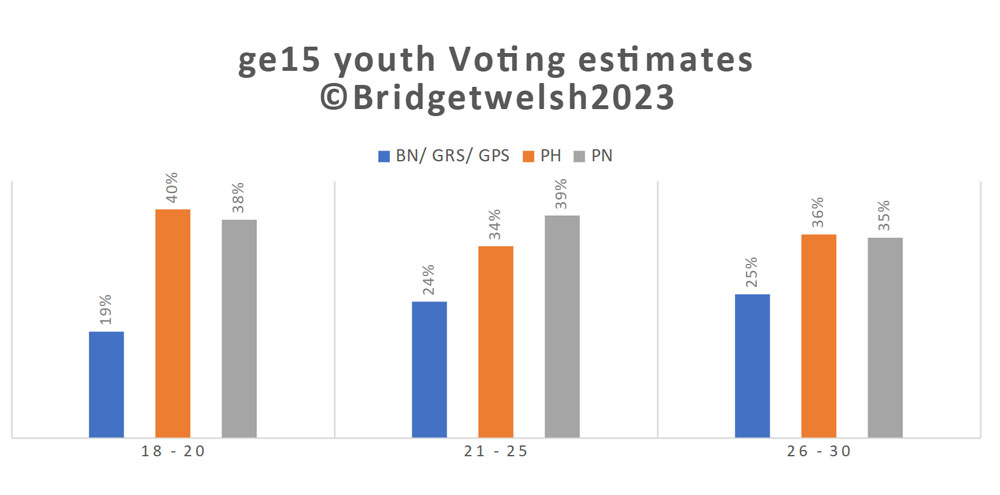When the GE15 results and Perikatan Nasional (PN)’s electoral gains came in, there was a groundswell of focus on younger voters. They were blamed/credited for the seismic shifts in Malaysian politics, particularly a touted ‘green wave’.
Youths were tagged with all sorts of labels, from lacking political literacy to greater conservatism. Some went as far as to blame Undi18 for the results, criticising broader enfranchisement of supposed ‘immature’ voters.
This second article in the ‘Looking beyond ethnicity’ series focuses on generation voting. From how different age cohorts voted to which came out to vote, the findings challenge the mainstream view that young people don’t care about politics and are less committed to building a stronger future for Malaysia.
The analysis yields estimates in voting draws (again) from the careful study of national polling station results and the age data by saluran from the electoral roll (rather than the less accurate methodology of looking just at the saluran results).
The findings show that PN’s gains among youth in GE15 are overstated and that Pakatan Harapan maintains considerable support among youth, especially among Undi18 voters. Youth are actively embracing new political alternatives, with a desire for change and better governance.
High Undi18 participation
Let’s look at the findings: The first major observation is the high turnout of Malaysia’s youngest voters. Undi18 voters came out at an estimated rate of 79 percent, on par with voters in their 50s. To put this in context, Undi18 were among the highest participants in GE15. Those given the right to vote embraced the opportunity to participate.

It is those in their late 20s and early 30s (as well as those above 60) that had the lowest participation. These ‘young-but-not youngest’ is often the group of people who are working outstation.
Clearly, many were not able to return to vote, often for financial reasons. This finding reinforces the point made in earlier analyses – remote and postal voting is needed!
The lack of a mechanism that allows those away from home to vote disproportionately impacts younger voters who lack the resources to return.
Importantly, the variation among the different age cohorts in turnout was not as large as that with ethnicity, gender, or among different states, suggesting that age was not as decisive in shaping who voted compared to other factors.
Modest PN youth boost
The findings also show that PN won considerable youth support, an estimated 37 percent of those under 30 years old. This result is higher than the gains this coalition made among young people in the Johor 2022 state elections, where PN won 29 percent of those under 30.
The youth boost for PN in GE15 was nevertheless much smaller than has been hyped in the media. It is almost the same share of youth support won by Harapan, an estimated 35 percent.
Harapan maintained slightly over a third of the support of youth. This is not as high as it was in GE14, it is in keeping with and slightly higher than the levels of performance in Johor 2022. Like BN, however, their support came predominantly from older voters.
PN youth gains came primarily from BN/Umno’s erosion of youth support which fell to a mere estimated 23 percent of those under 30.
For BN/Umno, the generational findings should not be a surprise, as younger voters have been leaving this coalition behind for the past few general elections.

A generation lens on voting also shows that PN’s support is concentrated among younger voters compared to older ones. PN won only an estimated 19 percent of older voters above 60, the same group that is often held to be more religiously pious and conservative as they age.
The findings call into question how we understand what is shaping how and why the youth vote as they do.
They suggest that what drove youth voting behaviour in the GE15 results was not necessarily religious values but a desire for different governance.
With nearly 80 percent of youth voting for non-Umno, youth are embracing new political alternatives, change that embodies new opportunities and hopes for the future.
Not all youth vote the same
Broadly, youth are as divided as older generations, split between the different coalitions. A closer look at the results also finds considerable variation among the youth themselves. Where they live and their age mattered.
Youth voting for PN in GE15 is illustrative. PN did much better among youth in states where they dominated politically, and where there was greater outreach and programming/funding for youth.
In the (now) four PAS state governments, two-thirds of youths voted for PN – a clear sign that making gains in Kelantan, Kedah, and Terengganu will be difficult. PN performed much weaker in Negeri Sembilan, Selangor, and WP/Putrajaya among the youth.

How old the youth were also revealed differences. Harapan/Muda won the most support among Undi18 voters, from 18-20 years old, an estimated 40 percent nationally.
Even in areas where PN put in a strong fight buttressed by campaign resources, building on their electoral victories in the Johor polls, such as in Muar, Muda maintained over 40 percent of Undi18 support.
It was among the 20-25-year-olds where Harapan/Muda support dropped to an estimated 34 percent nationally. Among this age cohort, Umno support was modestly higher. This group also gave PN the highest support, although only slightly higher.

Rethinking youth voting and youth policy
Differences among the youth call into question the notions that political illiteracy and greater conservative values are primarily driving youth voting behaviour.
What appears to be as important are the experiences and conditions they face. Youth are making informed choices based on the information and alternatives they are given.
Rather than have an approach that starts from a patronising place where youth need to be educated and taught how to vote through civic education programmes so they can vote ‘properly’, there needs to be a better appreciation of the agency and ability of Malaysian youth to make their own decisions, to decide their own futures.
Greater focus needs to be placed on enabling youth to actualise their futures, rather than telling youth what they should do.
The GE15 youth vote shows that the overwhelming majority of younger Malaysians want a better, different future. They want less corruption, better policies, and a better quality of life for themselves, their families, and fellow Malaysians.
The political differences among youth also highlight the need to think about youth more carefully, recognising different cleavages, circumstances, and contexts.
Those entering university and vocational schools, for example, are facing different challenges than those on the job market, such as low wages and the need to support young families.
Some youths are especially vulnerable. The high school dropout rate, for example, creates serious conditions for these youth and their families, an issue that is largely ignored in programming.
Place also matters. The situation for youth in Borneo is different than that in Kuala Lumpur. Support levels for Harapan in Sabah were considerably lower than the national average, for example, at an estimated 23 percent. Here youth unemployment is especially high, with low wages.
So far, the Anwar government lacks a substantive programme for youth and has yet to adopt a lens that appreciates meaningful differences among youth. Greater youth engagement is needed, well beyond publicised town hall meetings.
A place to start is to appreciate that youths matter and deserve meaningful engagement, not just in and for elections. - Mkini
READ PART 1 : GE15 gender voting: Looking beyond ethnicity Part 1
BRIDGET WELSH is an honorary research associate of the University of Nottingham, Malaysia’s Asia Research Institute (Unari). She is also a senior research associate at the Hu Fu Centre for East Asia Democratic Studies and a senior associate fellow of The Habibie Centre. Her writings can be found at bridgetwelsh.com.
The views expressed here are those of the author/contributor and do not necessarily represent the views of MMKtT.




No comments:
Post a Comment
Note: Only a member of this blog may post a comment.